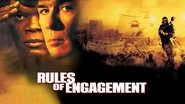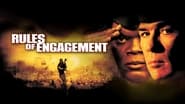mharah
"Rules of Engagement" is NOT "A Few Good Men." But it is also not the travesty that many reviews have made it out to be. The film was released in 2000, prior to the events of 9/11/2001 in New York City. Much has transpired since then, and Americans are slowly coming to the realization that, while not all Muslims hate us, the haters are all Muslims. And that is becoming increasingly significant, especially given the results of the 2016 election. "Rules of Engagement" takes a crack at explaining how difficult it is to fight Muslim extremists, whose tactics violate all the "rules" of warfare. Muslim extremist gunmen constantly use "innocent" civilians as shields, knowing full well that American troops will find it difficult to shoot back. "Rules of Engagement" revolves around this dilemma. Considering when it was produced and exhibited, this was not destined to be well received. Screenwriter Stephen Gagnan and story writer Jim Webb (yes, that Jim Webb) are not fanatics; their resumes show them both to be thoughtful and respected. It is unlikely they would be telling a story they did not believe in, just as director William Friedkin would not be bringing it to the screen if he did not believe it had a valid point to make. Before 9/11, the pacifist persuasion in the United States was imposing a heavy hand of deterrence on the American military. "Rules of Engagement" basically advocates that the enemy has to be taken out, even if it means collateral damage. Of course this elicited hoots of derision in 2000. A year or more later, with a lot of collateral damage in downtown New York, the reaction would undoubtedly have been much different. Many reviews have pointed out inconsistencies, factual errors, glib script devices, even casting anomalies. True, but inconsequential. "Rules of Engagement" is intended to point out the folly of the United States' approach to its enemies in a war unlike any other - a war we are still fighting 16 years later. It made its point, just a year too soon.
Ahmed Al Mahroos
I would rate this movie a 0/10 if I could! "Rules of engagement" written by John Webb ( former secretary of the navy) is obviously a political movie that portrays Arabs of both gender and all ages as terrorists. This movie is simply an instrument used to demons and dehumanize Arabs, and anyone who applauds to this movie is either null of intellect or is a racist who enjoys watching movies that demonetizes Arabs!At the beginning of the movie, US marines are in the US embassy in Yemen which is surrounded by aggressive and barbaric protesters. Here we see Arabs portrayed as a mindless barbaric race as they are attacking the embassy. The US marines then rescue the diplomatic staff, and afterward they are entrenched on the roof while the protesters are raging beyond. However when the Colonel (Samuel. L. Jackson) orders the marines to wave down the US flag, 3 US marines get gunned down by snipers. After the Colonel has lost 3 of his men, he then orders his men to open fire on the crowd, but one of his men claims that there are women and children amongst the crowd, but this didn't give the Colonel any second thoughts, he then shouts "Waste those mother f****s!!'', and they eventually opened fire on the crowd causing the death of 83 civilians, including the innocent children and women. Here I was shocked. I didn't believe what I was watching. I was disgusted.After this horrific and bloody scene, investigations take place. The Colonel appoints his old friend Hodges (fought side by side with him in Vietnam) as his lawyer. Hodges then travels to Yemen in the hope of finding witnesses. Afterward, he was told there that the US marines have opened fired first. As he was roaming around, he finds a young Yemeni girl that has lost her leg due to the massacre, and follows her into a hospital. In the hospital he finds many children who are in the same bad condition as her. As he is leaving the hospital, he finds an audiotape on the floor which he have already seen many copies of the same tape in the streets of Yemen. During the trial, the audiotape gets translated it and we then discover that it is a tape distributed by the Islamic Jihad which orders Yemenis to obey God's command by killing every American in the embassy. Here, the movie continues to create a bad image for Arabs and Muslims, as they portray them as cold hearted killing machines that obey a political group that promotes terrorism.Even though Hodges has gotten himself a solid evidence, it was not enough to prove that the Colonel has did the right thing. By the end of the movie Hodges has gotten himself a solid evidence, he has found a tape that shows that the protesters attacked the US marines first, and it showed that the whole crowd were attacking the US marines, including women and children!! We suddenly learn that the little we were sympathizing with is no better than the other Yemeni terrorists. The Colonel is then freed from charges even though he has caused the death of 83 Yemenis!!! Basically, this movie is trying to tell us that an American hero's honor is worth more than the lives of 83 Arabs, and that the lives of 3 US marines are equal to the lives of 83 Arabs, and this movie also shows that Arabs of all ages and genders are terrorist.One thing that disturbs me the most is that in the age whereas the US government are fighting off offensive stereotypes of other groups, they have encouraged the stereotypes of Arabs. Since 1896 till the present, Hollywood are demonetizing Arabs and depicting them as terrorists, and as we are becoming more technologically advanced anti-Arab movies has increased massively in the last three decades just as more news reports in the print media, radio, and TV have focused on radical Arabs and bad guys since 1948. This has impacted on the way people see Arabs, people living in the Western world who have never been to the middle east would consider the two words "Arab" and "terrorist" synonyms as they constantly watch movies that depict Arabs as terrorists. Movies like Rules of Engagement that dehumanize Arabs can also cause many people to have Islamophobia, whereas people would feel unsafe and horrified in the presence of Muslims as they perceive them as terrorists, and the constant and repeated use of the structured images that vilifies Arabs may influence aggressive perceptions, actions, and emotions towards Arabs. Posterior to the 9/11 attacks, movies that vilifies Arabs have increased dramatically which means that the number of people that hate and fear Arabs have also increased, and unfortunately movies that contain the same old consistent pattern of hateful Arabs stereotypes that rob an entire population of their humanity is still present as "Washington and Hollywood spring come from the same DNA"(Jack Valenti).
CineNutty
I am appalled at the low marks given. Such must be judged in the context of what happened recently in Afghanistan when there was negligent burning of Korans by Americans followed by apologies. If ever there was a film which captures and accurately sums up the forces at work, wherever we may tread in the Middle East, this IS IT. Now please note it was written and released PRIOR to 09-11-2001. Moreover, the performance by Guy Pierce was one of the best I have seen depicting a prosecutor at work in the military. I served in the Naval Legal Service Office in Norfolk, VA in the 1980s and he captured with accuracy the zeal of Marine prosecutors I have known. (It should be noted that he did an outstanding job in "L.A. Confidential".) I was duly impressed. As for the performances of Tommy Lee Jones and Samuel L. Jackson, they were first rate as well. Ben Kingsley was also at the top of his game,too. The production values were high and William Friedkin who directed both "The French Connection" and "The Exorcist" is more than able in this film. He captured effectively what we face whenever we have political dealings in the Middle East. I would counsel all who submitted critical reviews of this film to ask themselves, in light of current events, "Do you still hold that view?"
IClaudius7
Although this has been called "contrived" the factual basis, is not only possible, it is probable given all the deployments of our military personnel for the time frame depicted. Moreover, this piece of trivia would go against that assessment:"James Webb provided the story for the film, based partly on his own military experience in Vietnam and his tenure as the Secretary of the Navy under President Ronald Reagan; in 2006, Webb was elected as Virginia's newest U.S. Senator."I am not sure why it was given a "bad rap", but the courtroom scenes, especially with the prosecutor Guy Pearce, are some of the best I have seen depicted of a general court martial (I am an ex-JAG from the Navy). Moreover, the GCM result is also probable.The NSA who hides evidence is VERY believable. Loved the flick - it's now a guilty pleasure. I recommend it as capturing a scenario which could happen in at embassy in a Muslim country. As for production and direction, William Friedkin is a more than able director having won an Oscar for "The French Connection" and being nominated for another in "The Exorcist". The cast includes notables Oscar winner Ben Kingsley, Oscar nominated Anne Archer, and the ubiquitous warrior Dale Dye to go along with Oscar winner Tommy Lee Jones and Oscar nominated Samuel L. Jackson. All in all, it was given "short shrift" perhaps because of politics. The story was more than exciting for the purpose.




